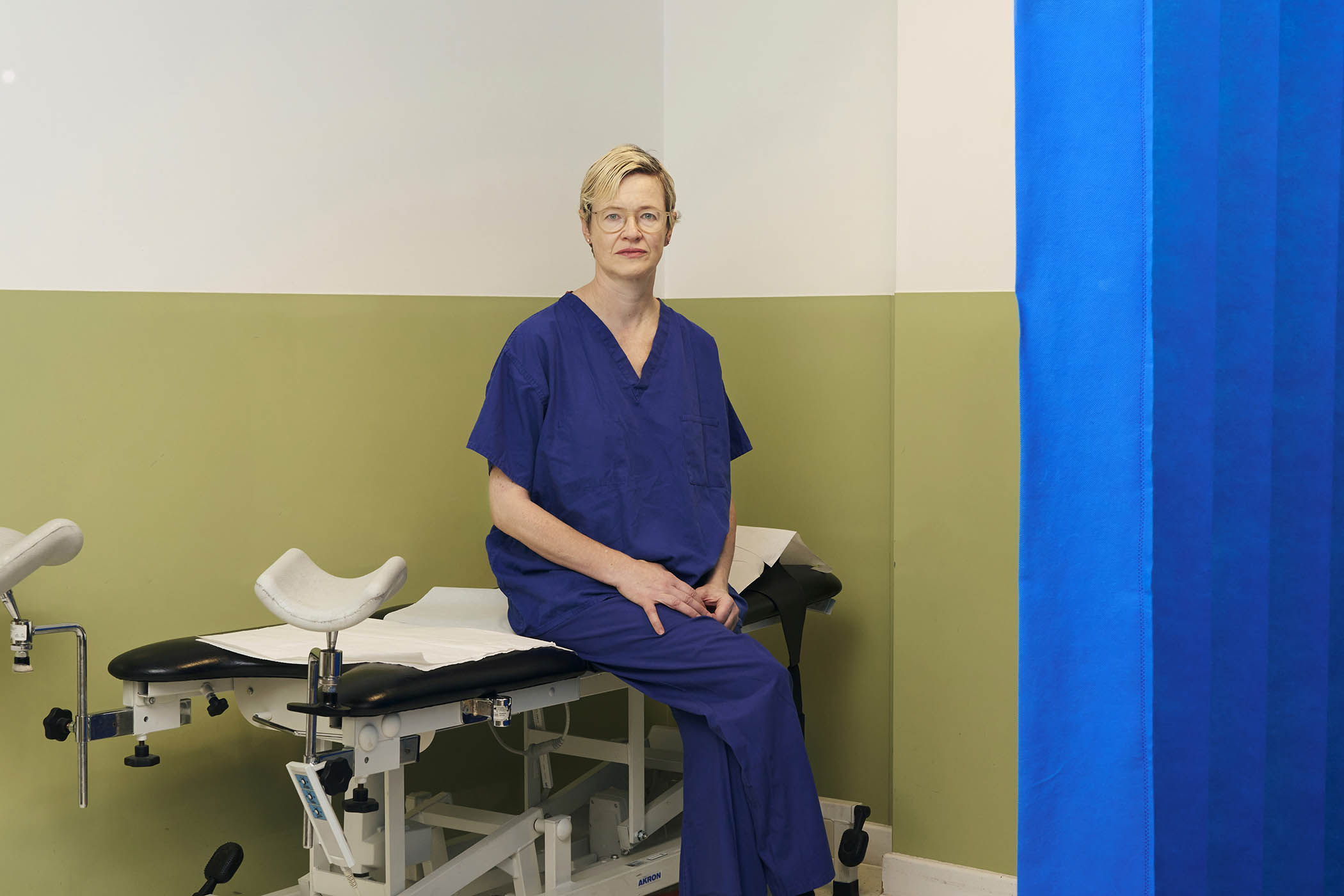Portraits by Suki Dhanda and Richard Saker for The Observer
For 13 years the transplant surgeon James Gilbert sexually harassed many women colleagues in and around the operating theatre.
The renowned specialist took advantage of his position as an educational supervisor to grope junior medics and bombard female trainees with sexual innuendo – including during surgery – at the prestigious Oxford Transplant Centre.
“It was a constant game of cat and mouse,” says one of his victims, Ms G, now a consultant surgeon, who testified against him at a medical tribunal. “It was a systematic takedown and manipulation of vulnerable trainees. And it was in the context of operating – you were working to look after patients and this was what he was distracting us with.”
Last year, the Medical Practitioners Tribunal Service (MPTS) ruled that Gilbert’s fitness to practise as a doctor was “impaired” after finding that he had touched women “inappropriately” without their consent and created “an intimidating, hostile, degrading, humiliating and offensive environment” for female surgeons. The panel determined that his actions between 2009 and 2022 were “sexually motivated” and “an abuse” of his senior position. Yet the surgeon, who once described himself as the “golden boy” of the transplant unit, was only suspended for a year. This week he was eligible to start operating on patients again.
‘It’s completely demoralising. I’ve sacrificed so much in the past few years. It’s all been for nothing’
‘It’s completely demoralising. I’ve sacrificed so much in the past few years. It’s all been for nothing’
Ms E, Gilbert whistleblower
A fitness to practise hearing found that Gilbert was “remorseful” and had “taken positive action to ensure that his misconduct is not repeated”. He apologised to his victims and promised to be “an ambassador for change against inappropriate workplace behaviour”, particularly towards female colleagues.
The women who blew the whistle are appalled. One of his targets, Ms E, described at the tribunal how Gilbert would massage her shoulders, tickle her around her waist, ask her about her underwear and stare at her breasts. Sometimes he made sexually suggestive comments while performing surgery together and touched her under the operating table, on one occasion sliding his knee between her legs and squeezing her thigh.
Now she says: “I feel utterly let down by the system. It’s completely demoralising. I’ve sacrificed so much in the past few years to try to do something to protect other people. It’s all been for nothing. He’s free to work again..”
Related articles:
Ms G added: “I feel that the punishment hasn’t really acted as sufficient deterrent; it makes a mockery of the whole process.”
The case has raised serious questions about the effectiveness of the regulation of surgeons and the incongruities within a system that is supposed to protect patients.
The General Medical Council (GMC), the independent regulator, called for Gilbert to be permanently struck off, but the tribunal decided he should be given a temporary eight-month suspension, despite concluding that his behaviour “did not uphold the standards of the profession”. This was increased to 12 months by the High Court.
It is not an isolated discrepancy. Research published by the Royal College of Surgeons of England (RCS England) and the British Medical Journal found that in nearly a quarter of cases, the sanction imposed for sexual misconduct by the MPTS is more lenient than the one proposed by the GMC.
The study analysed 222 tribunal cases heard in the year to August 2024. Of these cases, 46 involved proven sexual misconduct, with offences including harassment, rape and child abuse. All the perpetrators were male doctors, with more than 80% holding positions of authority, such as consultant or supervisor. Several cases involved several targets, showing repeated and systemic abuse. More than a third (35%) of proven sexual misconduct cases resulted in a suspension rather than erasure from the register.

Lead author of the report Mei Nortley: ‘the system enables sexual misconduct’.
Mei Nortley, a consultant vascular surgeon and lead author of the report, says the analysis uncovered “inconsistency and perceived leniency”. “Sexual harassment has been normalised,” she warns.
Earlier this year, a doctor, found in a tribunal to have committed a rape, was suspended for 12 months. “If you are a young trainee who is being sexually harassed and you see that kind of sanction being given, then are you then going to report what is happening to you? Not in a million years. And therefore the system is enabling further sexual harassment,” Nortley says.
She insists there must be a complete overhaul of tribunals, with better training, more robust sanctions and legal support for victims as well as defendants. At the moment, victims are treated as witnesses so receive no legal advice or advocacy support, even though they are routinely cross-examined by the defendant’s barrister and can even be questioned by the man they allege abused them.
“There needs to be a specialist framework for sexual misconduct,” says Nortley. “It cannot be an afterthought within sanctions guidance designed to manage all other forms of misconduct.”
The RCS England is also calling for urgent reform. Professor Vivien Lees, the vice-president, says the “failures” in the regulatory system “risk leaving perpetrators in power and eroding trust in the profession”.
This week, a medical tribunal ruled a doctor who left a patient on an operating table under anaesthetic to go and have sex with a nurse in another room should not be sanctioned.
Surgery is still one of the most male-dominated medical specialisms. Although women make up more than half of the places at medical school, only 17% of surgical consultants are female. Just 9% of trauma and orthopaedic surgeons are women.
Female surgeons describe a “boy’s club mentality” that too often makes women feel unwelcome or denigrated. One trainee was told that full-time surgery was “not an appropriate career choice” for mothers.
A 2023 survey found that two-thirds of women working in surgery had been sexually harassed by a colleague at work. Nearly a third had been sexually assaulted by a colleague and there were 11 instances of rape.
Ms G says some surgeons develop a “God complex” that makes them feel they can act with impunity.
“If you’re a transplant surgeon you are literally giving life to people who would otherwise not be alive,” she says. “And then the environment and the culture and the opportunity exist.
“It’s like the Catholic Church and paedophiles. It’s male-dominated, individuals can do no wrong and so the advantage rests with the perpetrators. Things are hidden and not discussed.”
A GMC spokesperson said: “We take a zero-tolerance and proactive approach to all forms of sexual misconduct.” An MPTS spokesperson said new guidance was being drawn up for tribunals to ensure they reached “consistent and well-reasoned” decisions.

‘People who feel that they are saving lives on the one hand can afford to do something that is less honourable’: Tamzin Cuming
Moral bargaining
Tamzin Cuming, a colorectal surgeon and co-chair of the working party on sexual misconduct in surgery, writes:
“Perpetrators engage in a form of ‘moral bargaining’ with themselves. People who feel that they are saving lives on the one hand can afford to do something that is less honourable. It is almost offset in their mind.”
As a trainee, Cuming used to study rugby scores so she could turn conversation in the operating theatre away from questions about her sexual activities.
“I had one consultant who touched my breast with his arm as we were operating,” she recalls. “The first time it happened I thought – did he do that on purpose? [He] did it again so I thought, ‘Oh he did.’ I kept trying to move away but I was in the middle of an operation.
“Patients are clearly at risk if a surgeon is distracted. There was one case where a surgeon was examining a woman’s breasts when she was under anaesthetic and the operation was nothing to do with the breasts.
“The medical tribunal process is not fit for purpose. Doctors who have made their female colleagues’ lives a misery for years are given a slap on the wrist and allowed back to work.”
• The headline of this article was amended on 26 September 2025 to make clear that the quotation used (‘He touched my breast ... in the middle of an operation’) does not refer to Dr Gilbert, but to an unnamed consultant.
Photograph Chris Furlong/ Getty Images
Newsletters
Choose the newsletters you want to receive
View more
For information about how The Observer protects your data, read our Privacy Policy



